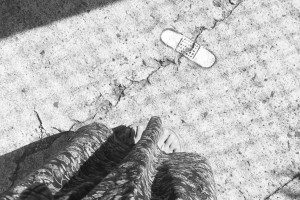My father was a meth addict.
No. That wasn’t a line from a movie scene or from a popular TV series.
My father was a meth addict. I was there the first time he lashed out. It was to my mother, who was several months pregnant back then to my now 17 year old brother – meaning I was barely 5 at the time. I heard them fighting outside our house, and went out only to see my mother crying, pleading for her and her child’s safety. My father, broken ketchup bottle on one hand and my mother’s life on the other, was the recipient of the pleas. It was a scarring sight for the 5 year old me but I remember it vividly because that was the first time I stood up for somebody.
This is not about me. This is not about my father either.
That kind of scenario went on for years. My father, under the influence of drugs, alongside his already bad temper and violent tendency, would occasionally hurt my mother, my younger sister, and I in rotation. That is the kind of household that the little me had to be in.
But this is not about me. And this is not about my father either.
I was there when my mother retreated to her family’s house; her siblings comforting her as she recounts the story of how my father would snap like a fragile twig apprised under a humongous methamphetamine foot. It was the first time I saw a family meeting that large; I felt like a celebrity. It was the first time I tasted the bitter reality of the person that my father was. It was also the first time I heard a word that I had no success in understanding no matter how hard I try.
Martyr.
Catholic faith tells us that martyrs are people who chose suffering and death instead of renouncing their faith. On the other hand, romantic movies tell us that martyrs are those who turn a blind eye to the wrongdoings of their partners for the sake of their relationship. While those two are very different ideas in semantics and philosophy, they meet at an intersection: martyrs are those who sacrifice something for love.
Our present-day reality is this: martyrdom equals stupidity. Sadly, we live in a world where the return of investments is more valuable than genuine gratitude; that we give because we expect to have something in return.
But remember that there is a fine line between reality and truth.
The truth is this: sacrifice makes love sweeter. My mother was called a martyr because she stood beside my father during his darkest of times. She was called a martyr because she believed that love is enough reason to still believe in the goodness of people. She was called a martyr because even though she was hurt, broken, and battered, she still chose love because she knew that that is what Christ would do.
She believed that my father deserved a chance, because love deserves every chance it can get.
He did. And he took it.
I was there when Papa got clean. After so many years of struggle he made his way out. But the substances he abused also abused him. The family discovered he had cancer that was already terminal. It was a two-year strife.
I wasn’t there when he died. Mama was, all along. She was there for Papa through everything he has been. Through thick and through thin, in sickness and in health, for richer or for poorer. Whenever she had to choose, she always chose love. And through that same love, my father has found redemption.
There is a cliché slash slum book entry that goes “Love is sacrifice.” Never did I realize that it has never been truer. Because for love to be true, it must cost, must hurt, and must empty ourselves.
Mother Teresa once said, “I have found the paradox that when you love until it hurts, then there will be less hurt, but only more love.”
Because if love was a drug, then it is the only drug worth taking.
[second_picture]
I was there when my mother was called a martyr. I was there when she was. I was there when my disintegrating family was only once held by a tense string of my mother’s martyrdom. And I was there when that very string renewed by home.
This is not about me. This is not about my father. This is not about my mother either.
This is a story about a choice: a choice of love, hope, compassion, and redemption, the way the Author of love intended for it to be.



